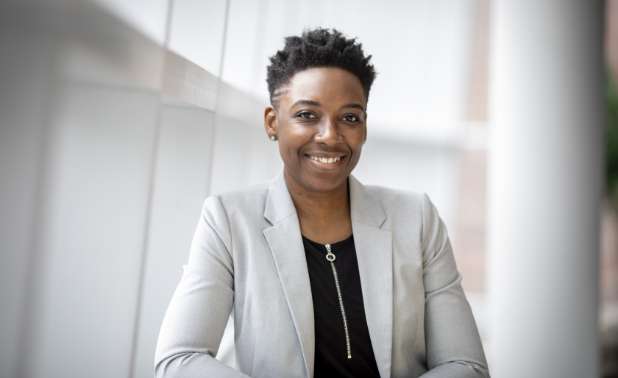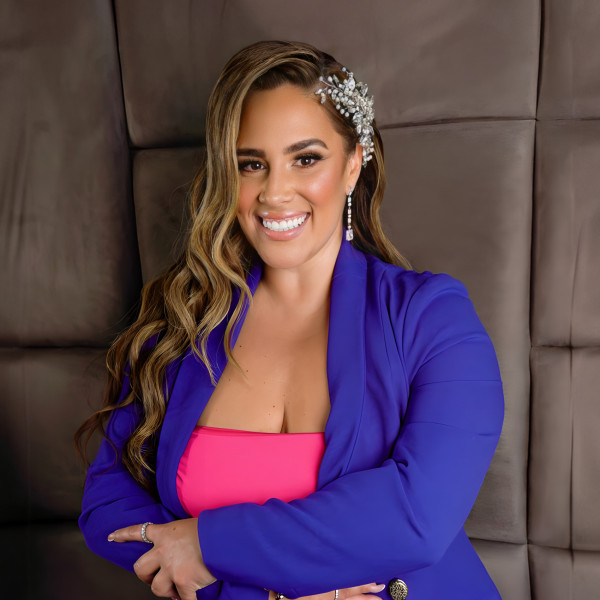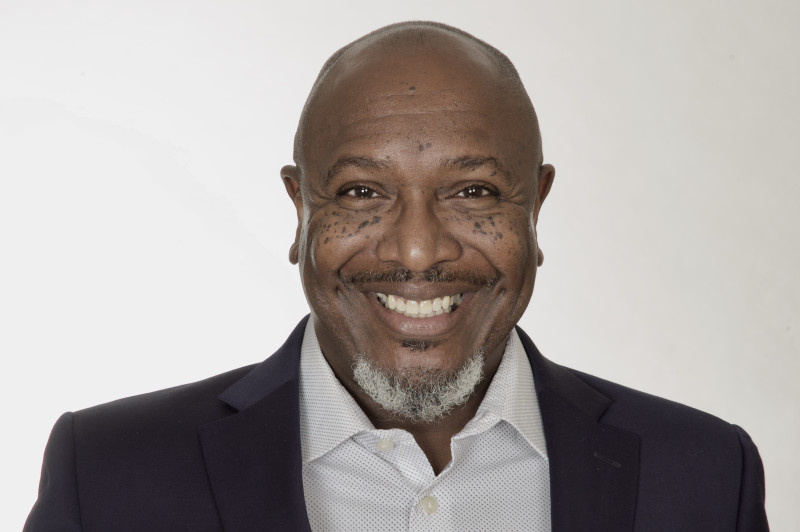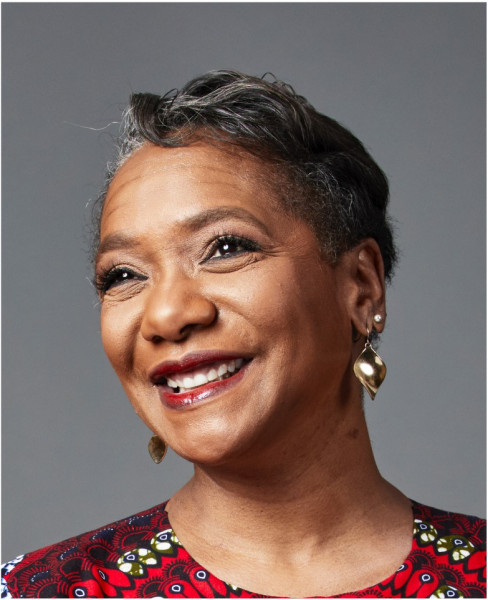Kamela Forbes:
Welcome back to another episode of But First, People, a podcast that dives into the incredible diversity of the world of world. I'm your host, Kamela Forbes, and I'm thrilled to introduce our amazing guest today, the one and only Victoria Jenn Rodriguez. Victoria is the visionary founder of VJR Enterprises, a diversity talent management consulting agency that advises clients how to create, foster, and institutionalize inclusive workplace cultures. With over two decades of strategic leadership experience, she's trained over 15,000 leaders and entrepreneurs in optimizing performance, while emphasizing emotional intelligence, reflection, and life balances. Renowned as the imposter syndrome killer, she has received remarkable results and has collaborated with a diverse client roster from small businesses to Fortune 500 giants like Amazon, iHeartMedia, Coca-Cola, Morgan Stanley, Pfizer, and many more.
And it doesn't just stop there. Victoria hosts a very own video podcast, Banking on Cultura, exploring the vibrancy and complexities of Latino culture, entrepreneurship, and everything else in between.
In this episode, as we celebrate Hispanic Heritage Month, we'll share insights on how individuals should own their culture as a competitive advantage. And also talk about other programs and initiatives corporations can employ to increase retention, as well as outline a framework that will not only help you to embrace imposter syndrome, but also harness it for meaningful growth and success. Without further ado, Victoria, welcome to the show.
All right. Before we kick off, I'd like to wish everybody a happy Hispanic Heritage month. This is going to be such a great conversation. I'm so excited to chat with you, Victoria. One of the things that we love to start our podcast off with is a little song, a little jingle. It's a welcoming moment for us, for you to be real and raw and get connected and just feel like you're a part of the family. Let all your inhibitions go. It's something that we do within our firm every Monday. Every new employee that joins has this opportunity to kinda just show us what they're made of. And whether that's good, bad, or ugly, we take it and we embrace it. We welcome you for who you are. So, what song are you going to sing for us today?
Victoria Jenn Rodriguez:
I picked this song because I think we need more of this in the world. And I chose Love by Nat King Cole. And shoutout to everybody who is listening. Hold on to your ears, baby, because I'm going all in.
Kamela Forbes:
Let's do it.
Victoria Jenn Rodriguez:
All right. So here we go. L, is for the way you look at me. O, is for the only one I see. V, is very, very extraordinary. E, is even more than anyone that you adore. And love is all that I can give to you. Love is more than just a game or two. Two in love can make it, take my heart, but please don't break it. Love was made for me and you.
Kamela:
Woo. Yes.
Victoria Jenn Rodriguez:
Thank you. Thank you. Anyone that wants to sign me onto a label, I'm available.
Kamela:
Yes, yes. Let's do it. Let's add one more title to all of your other amazing titles. Well, why not artistic extraordinaire. All right, Victoria, that was amazing. Now, let's see. There's a lot more amazingness from you. I'd just like to start off by asking you, I know for over two decades you've been training other entrepreneurs and leaders and advising other organizations on how to build high engagement workplace cultures. You leverage your personal and professional experiences to help others, and you've created an online learning platform to assist ambitious women transitioning from corporate to entrepreneurship and revolutionize the way that they work and do business together. But what is your why for investing so much of your time and energy to build others up?
Victoria Jenn Rodriguez:
Sure. I don't know how many folks are spiritual on the line, but I actually got reconnected to God during the Pandemic. And it was at that time that I really understood my why. It was for him to use me as a vessel to really show people that they are more powerful than they think they are, that they are more incredible than their self-doubt might present. And that they have a voice, which is their most valuable asset, and they need to use it often. And they need to be the change that they want to see. And so, my why is really to show people how to be the best version of themselves, because when we give ourselves permission to do that, it allows others to show up in that same fashion. And I think we'll just have happier people on the planet if we stop pretending to be who we are not and just really owning who we are.
Kamela:
I love that. I think you've definitely figured that part out, right? Because you're a super proud Latina and you never miss an opportunity to mention it, to highlight it, to just show your heritage. And it seems like you just remain authentically true to who you are. But can you tell us some ways that your ethnicity has been a headwind, meaning a bias against you, or some ways that it's been a tailwind, meaning a privilege for you?
Victoria Jenn Rodriguez:
Sure. I'll share a quick story. I grew up on Wall Street, that's where I started my career. And I remember I was introduced to this badass Latina, like she was killing it. She was doing her thing. She was second in command to the CEO, and she was one of the first people I met when I started in the industry. And I remember her telling me, "Hey, I need you to pin back your hair. Your hair is a distraction and it's going to deter people from seeing your intellect. You should really truly pin back your hair." And at the time I was rocking my curls because I'm Latina, it's a part of my cultura, a big part of my culture, and I'm sure many folks listening can relate is your hair. It's part of your DNA.
And so, when she said that to me, it kind of broke my heart, but what really got my wheels going was the second thing she said. And it was, that was the advice that she got from the CEO. And ever since he told her that she has worn her hair in a bun. And when she told me this message, sure enough, she had her hair in a bun. And it was at that moment that I had a decision to make. Whether I was going to follow suit and look the same as everyone in the office, or I was going to do my own thing. And I'm pretty sure a lot of people have come across those situations where they second guess themselves and really thought about, "What do I do in this instance? Do I fit in to get ahead, or do I stand out?" And I think that for many of us our culture, the preconditioning has been, tone down who you are, tone down who you are. Don't show up with our, at least for Latinos, don't show up with all that vibrancy and all that spice, calm down.
You know what I mean? You have to fit in. That's how you're going to get ahead. Because our ancestors fought just to get here. And so, we don't want to stir the pot, we just want to get ahead. And so, for me my hair sometimes worked against me. Because I would rock my curls to board meetings literally, and I would get the looks and I would get the stares. People thought that my role was to provide coffee and to provide breakfast for people in the office because of the way that I looked. I looked like I didn't belong. Where that has worked to my advantage has been throughout my entire career, the feedback and my performance reviews. I know we all love our performance reviews. And our performance reviews it was always like, "Hey, Victoria, you're an incredible asset to the team, but you know what? You're a little too much. You need to tone it down a little bit."
And with all feedback, you know, had to make a decision whether I was going to internalize it or not. But I always welcome constructive feedback. But it has been something that I've been told is a negative thing about me where now I have curated a life where all of those things that I was told I needed to tone down or that was too outlandish that would hinder my success is actually what is allowing me to have success today. Now people pay me for that vibrancy, "Hey, how can we get our employees to feel more engaged here? How can we help them be more like themselves? We don't want them to tone it down. How can we help them tone it up?" So, it's just so ironic that once we decide that we are going to take ownership of who we are and who we are not, that's when the magic happens.
Kamela:
I love it. And I got to tell you, yes, it definitely is a tailwind for you now. Because I remember the first time I met you, you came to our offices to have a meeting with somebody on my team. And while I didn't remember your name, I remembered you. I remembered you for just being so vibrant. And shame on me, but I just remember saying, "What's the name of the spicy woman that is here?" And that's what I remembered you for, your vibrancy. And so again, I think it's the message to everybody to own who you are, own your culture, be you, be authentically you, and people will remember you, right?
Victoria Jenn Rodriguez:
Totally.
Kamela Forbes:
They will call you back. They will know your name. They will know who you are, so I think that's such an important message. But not only are you a proud Latina, the press often refers to you as the imposter syndrome killer. Now, that's an awesome title to have. And I know you recently just launched your own podcast Banking on Cultura. I'm trying to say it like you, Banking on Cultura. And you mentioned that you've experienced all the fields of imposter syndrome just bringing that podcast to fruition. Can you tell us firsthand how you dealt with it, and then maybe share some tools that our listeners can have to do the same when they have those moments of imposter syndrome?
Victoria Jenn Rodriguez:
Sure. The first foundational message I always like to share when it comes to imposter syndrome is that it is a good thing. Because when you experience imposter syndrome, it is a signal that you are expanding yourself. You are doing something new. You are doing something that makes you uncomfortable. And I always like to give the analogy, when you go to the gym and you have a crazy intense leg day, in the moment you are miserable. And then the next day you're so sore, but then you pass by that mirror and you're like, "Ooh, okay, gains, I see you. I'm looking good." But it took you being uncomfortable. It took you perhaps doing something that you may not have wanted to do in order to get the results. It's the same thing with imposter syndrome. It is actually a very good signal that you're onto something, so double down.
Which is why when I was experiencing imposter syndrome launching my podcast, completely new space for me, I had no idea what I was doing. I didn't understand the equipment, I didn't know the game, I didn't know how to monetize it. I had a crazy steep learning curve. And when we are put in those situations where there's so much ambiguity and so many unknowns, it's very easy for us to feel like, "Am I doing the right thing? Is this really for me? Who do I think I am trying to completely reinvent myself again? What's going on here?" And what got me through was the understanding like, "This is good, this is good that I'm feeling this, because I'm thinking outside the box and I'm allowing myself to grow and stretch myself. Instead of being comfortable and being just content where I am." And it's the gift and the curse and the ambitious. We always want to do something new. We always want to try something out. But with that comes a lot of fear, and you're human first, so it's completely normal. That definitely allowed me to get through.
And I would say secondly, like with anything difficult and challenging in life, if you just keep going and not quit and just fight every day, fight through the fear, fight through the emotional rollercoaster, fight through the self-doubt, fight through the overwhelm, the anxiety, all the things. If you just keep going and keep doing your best every single day, you will see the light at the end of the tunnel. Which is why we're so successful now. We launched last week, had over a million impressions. All that fear, totally worth it. Because now we're seeing the fruits of our labor. But it wasn't easy. And I know in the corporate space, we're all in this funky place. We're still stuck in the between in the sense of we're trying to figure out what we want our legacy to be, what kind of value we want to contribute to the world and how is that aligned to the organizations that we are a part of?
And so, we're all just figuring it out as we go, which adds an additional layer of uncertainty, a.k.a. insecurity, which impacts our performance. And so, I have a framework that I would love to walk people through, if that's okay?
Kamela Forbes:
Yeah.
Victoria Jenn Rodriguez:
Okay. This is called my Don't Panic Framework, and it's very straightforward, because I want you to not panic. Don't panic. Imposter syndrome is really normal. This framework is going to help you get through whenever you are experiencing moments of imposter syndrome. And for those who may or may not know, because it's interesting, I'll talk to some people about it and they'll be like, "Well, what is imposter syndrome?" They don't even know what it is or that they're actually experiencing it. For folks who might fit into that box, imposter syndrome is just when you feel like you don't belong, you don't fit in. You feel like you didn't put in the sweat equity to earn the spaces that you are in, and somebody's going to find you out. Somebody's going to find out that you don't belong here. You didn't earn your position in that space.
And so that essentially is what it is. My framework is a four-step framework, and the first part starts with self-awareness, which everything in life starts with self-awareness, right? You need to understand when imposter syndrome is happening. Is it before you go and speak in front of a large audience? Is it before you go to have a difficult conversation with a team member? Is it when somebody is questioning the value that you bring to the office? When is it happening? Because if you're able to identify when imposter syndrome is going to be all up in your grill and all in your space, it's easy for you to prepare. Write down, "When do I feel the most like this imposter syndrome coming up? When is it happening?"
And then the second piece of the framework is you need to have a badass re-committee, a.k.a. a sweat equity committee. Meaning somebody, a group of people, I would say five to seven, who knows who you are, who believes in you, who understands the achievements that you've made, who can refill your cup when it is empty, who can remind you of the amazingness that you contribute to this world. And you'll call them and be like, "Hey, I need this pep talk before I step into this room. Pour into me, go, you're on." And it is a very prestigious role to have to be on this committee. Let people know that they're on call and that they're on the committee, right? Because we all need those people in our lives that are able to refuel us, or remind us of who we are in moments of self-doubt.
And the third piece of the framework is mirror real talk. I'm a firm believer in talking to yourself. Becoming your own best friend, reciting affirmations to yourself in the mirror, and really talking up yourself. Because when somebody else is feeding you, is pouring into you, it feels great and it feels good.
But when you're able to do that for yourself, that is so much more powerful that it allows you to become more comfortable in your skin. And also, when you speak out into the universe and you hear yourself saying, "I'm amazing. I'm incredible. Nothing can stop me. I am destined for this opportunity." It not only signals to the universe that, yes, you are here and people better move out your way, but it also allows you to believe it, right? Because you've said it. So it's important for you to practice mirroring real talk.
And then the last piece of the framework is all about celebrating wins. And I'm talking about any type of win, small, medium, big, even you making your bed every morning before you leave the house. Celebrate every single win. Every time you have an opportunity to celebrate an achievement, do it, do it. Because we need to remind ourselves of everything that we've accomplished and why we work so hard and why we show up every day and why we choose to live the way that we live.
It's important for you to celebrate all the time. Life is meant to be lived, so live it and celebrate it. That's my quick framework for you all.
And then the last thing I'll share, and then I'll pass it back to you, is if you ever think that you are alone, I want you to think about people that you admire. For me, Jennifer Lopez, Maya Angelou, Michelle Obama, all women that I look at, I'm like, "Wow, they're freaking incredible. They're at the top of their careers. So much impact, so much legacy there." Each of them have admitted recently to now experiencing imposter syndrome. If you have folks at that level who have achieved so much and who doesn't need to explain themselves to nobody, experiencing imposter syndrome, again, it should signal to you that you're with the greats, that this is good. Keep walking down your path, keep experiencing imposter syndrome, because it means that you are going in the right direction.
Kamela Forbes:
I love it. I love the framework, that piece by piece, breaking it down, building yourself up, recognizing it, calling in your committee, doing the self-work, and then celebrating it all. I love that breakdown. But I think even more important is just a message that, if you're not experiencing imposter syndrome, then you're not doing something right. You're not pushing yourself enough, you're not growing.
Victoria Jenn Rodriguez:
Correct.
Kamela Forbes:
I think just having everybody recognize that, "I want to feel that. I want to know that I'm challenging myself and that I'm going to come out on the other end of this so much better." I think that's just the most amazing message that people shouldn't be trying to run away from it, but rather run toward it.
Victoria Jenn Rodriguez:
Totally.
Kamela Forbes:
As the name implies, you're Banking on Cultura podcast is edutainment for Latinos to celebrate the vibrancy and the complexity of Latino culture, and the inspiration for owning their Latinidad. It's a new word I just learned from you.
Victoria Jenn Rodriguez:
Oh, really? Okay. Awesome. We're already educating. You, see? You, see?
Kamela Forbes:
Yes see, we love it. And I'm saying these with all the flare that I could muster.
Victoria Jenn Rodriguez:
Yes.
Kamela Forbes:
But tell us, how can people use their culture as a competitive advantage to stand out? Obviously, you do it as a great job. We've talked about some examples of that, but what would you say to our listeners as to how they could use theirs to stand out?
Victoria Jenn Rodriguez:
Sure. The first step, again, with everything is just really identifying what about your cultura, your culture makes you different. A.k.a. makes you significant, right? Because if you look and talk like everybody else and you show up like everybody else, it's very easy for you to blend in and be overlooked. Think about those things in your culture that help you stand out. For example, as a Latina we're very resilient, we're very welcoming. We love to celebrate. We love family. We love to dance. We have this energy that's built into our culture that people just want to be a part of. That's why when Salsa comes on, people on the dance floor, they have no idea what they're doing, but they're out there, merengue comes on, they out there, because even in our music, it makes people move. There's an energy there.
By you not bringing that to the office, you are stripping yourself of some of your magic. When you're checking that at the door and choosing to put on a mask every time you walk into that office, not only are you creating additional anxiety and stress for yourself, because it takes so much more energy to pretend than to just be. But it also doesn't allow you to create a competitive advantage, which is who you are. That is your competitive advantage. Nobody is you. And as cliche as it might sound, try it and then come back and talk to me. Try it out, and then come back and talk to me. Because those are the things that are going to resonate with folks and also humanize you. A lot of what employees, leaders, what they are yearning for, and what a lot of cultures, corporate culture is missing is the humanization piece of workforce building. It's very robotic, it's very vanilla. It's very cookie cutter.
And if you think about what people want from organizations and what they're looking for, top talent, what they are seeking? They're seeking a place where they feel seen, where they feel heard, and where they truly feel like they can be themselves. And that requires a humanistic approach. When you allow yourself to bring in those cultural influences, you're showing more of your human side, because that's what makes you. And people will relate to that, and they'll be like, "You know what? I really like this person. I can relate to this person." Which is why I always encourage people to be vulnerable at the office. Be vulnerable. You had a crazy morning, your kid was screaming at the top of their lungs and you were just running around. They didn't want to get dressed for school. That's a lot to carry and not be able to breathe when you are around people that you're spending 40 hours with a week.
Thinking about those cultural things is super important. And some cultures it might be you're raised to be more analytical. You might be raised to pay attention to data before you speak. All of these little things that you consider to be perhaps nuances or negative things. Because we've been so preconditioned to believe that if we don't look like the "standard" or if we don't fit in, then we are hindering our success. Let me not even introduce that part of myself. But what you're doing, you're actually just, you're creating a barrier for you to truly shine and really operate at your fullest potential. Because you're putting, again, so much energy trying to tame down that part of who you truly are. And it impacts your performance. Thinking about those cultural influences and using them as a competitive advantage versus an Achilles heel will set you free.
Kamela Forbes:
Yes. Well, I think that's one thing when you speak to the employee and encourage them to show up as their true selves and bring their culture to the forefront. As you mentioned before, you want to wear your hair and bring all your vibrancy, and sometimes that works against you. Just right now I think it's so important why we have heritage months and we're in the midst of celebrating Hispanic Heritage Month right now. Can you share what your message has been to the organizations for them to empower, support and elevate their Hispanic employees?
Victoria Jenn Rodriguez:
Sure. It's interesting, because I speak to a lot of executives. And usually executives come from, they have more seasonality. They've been in this game a long time, and they've also had to play a different type of game. They are leading, they are advising going off of their experiences and how they had to fight so hard to just make it in the room. And here these other generations come, and they want to show up as themselves. And it's like, "What? No, we don't have time for you to show up as yourself." And organizations are, there's some fear there. Because they're like, "Whoa, if we let everybody be themselves, how are we going to control the narrative? How are we going to control how people show up? We can't just have everyone just free balling out here." It's this very delicate balance between the shift, allowing organizations to mature to where we are as a country, where we are as a people, where we are moving in terms of our workforce, what do they want?
How are you going to retain this talent, right? Because there's so many options now. Not only can they lead to a competitor, but they can go do their own thing. And so it's really important for everyone to tap into the change that is happening, both at the C-suite level and also at the workforce level. And so in terms of how people can empower others to really support and show up, what you want to keep in mind is that many cultures are not a monolith. You can't fit everyone into a box. And that is what a lot of organizations do, especially when it comes to Latinos. They either want to say everyone is Mexican, or they want to loop you into this box, not understanding that there's so many layers to what it is to be Latino.
And we're not alone in that. There are a lot of other cultures who also share in that as well, but there's a lack of education. There's a lack of education. I would say the first thing that organizations can do is invest in their leadership to understand, to get some training. I'll share something that I had a client do, which was totally outside of the box, something they would never do before. But it has such huge impact. I rounded up the C-Suite and I said, "Listen, we're going to go spend the day in the hood. Let's go. We're going to go spend the day in the hood. We're going to go volunteer at shelters, we're going to have conversations with people. We're going to volunteer at schools. We're going to interact with kids so that they can get a real understanding of a culture, and also of a different upbringing than what they were exposed to."
Because until executives, leaders, people in authoritative positions, until they're able to experience it themselves, it doesn't matter what data you spew at them, it doesn't matter what you tell them should be done. It doesn't matter if they see the diversity numbers. It does not matter, because there's no emotional connection. Again, there's no human element to what you are telling them. And so it's very easy for them to just in one ear out the other, or not really understand the true significance of it all. And so that experiment took a long time to get buy-in. But once I got it done, to this day I get phone calls from these executives telling me how that experience changed their lives and also made them a better empathetic leader. And so now their teams are performing better. Their teams are not showing up late. Their teams are not just calling out just for the hell of it. They understand the bigger picture, because they don't want to disappoint the boss. Because now they have a human connection, they understand. There's an emotional connection that is happening, and so that is what mobilizes people. To not only stay at the organization, but also produce at their highest level.
Because now there's a human element introduced into the mix versus it just being crow, crow, work as usual, routine, mundane, all those things. If you really want to see change in your organization, think about creative ways that you can introduce your leadership to different cultures, to different environments, different communities outside of having a whole bunch of speakers come in for Hispanic Heritage Month. Does that make sense?
Kamela Forbes:
Love it. Like you say, let's get into the nitty-gritty. Let's put you in that environment and let's get you that opportunity to experience it rather than to read about it. I think that's so powerful, and I'm so glad you got that buy-in to make that happen. And like you said, it just goes to show how when you invest in your people it empowers them and it helps them to be so much more engaged in working for the organization and wanting to see the benefits of the organization succeeding. I know obviously we've been talking for a while about the Great Resignation. I think one of the solutions that you've created to that problem is to provide leadership development program. One which provides that smartly disruptive mental and emotional wellness experiences, that focuses on burnout, overcoming mindset barriers, and leading with energy in replace of authority. Can you tell us a little bit more about your "SHINE" Leadership Development solution?
Victoria Jenn Rodriguez:
Sure. If you guys have caught on, or maybe not, whenever I label something, it is very direct. It's called SHINE because the purpose is for you to shine, baby, okay? It's not for you to tone it down. And so that is what the curriculum entails. It is about how can we get you to a place where you are owning it? Where you are able to be confident enough to get buy-in for something so disruptive like the example I just shared. And so much of the curriculum is centered around peeling back the onion and understanding where the core root of your insecurity is coming from that is impacting you from being a better team leader, a better team member, a better speaker, whatever it is, what is the root cause? And once we identify the root cause, then we can create a toolbox for you to mitigate whatever it is that is coming up for you.
And I think what makes the program different than other programs on the market, and this is something that I stick to my guns about. A lot of leadership development programs, they are segregated. They're either for super senior folks, middle management, or entry level. That's usually what you see, which SHINE is cross-pollinated. Meaning I want to have senior executives in the room. I want to have middle management, and I want to have entry-level folks. Why? Because many of the emotional barriers that we are faced with, and much of the doubt that we experience are quite relatable, regardless of what level you are at. To my example, our girl J-Lo is experiencing imposter syndrome and she's on top. I want people to see that in real time. And allowing the cross-pollination of different levels to go through this vulnerable experience together already enhances your culture. Already introduces that human element to your culture.
And I also keep the program small, no more than 25 people in a cohort. Because I want people to be vulnerable. I want people to take off the mask. And so we can't do that with 100 people in a training. It needs to be intimate. It needs to make sense with who is in the room. I don't want your boss necessarily in the room. I might want a colleague that manages a different team in the room. And so I spend a lot of time with clients in designing who needs to be in the room to make sure that everyone has a transformational experience. And I spend a lot of time in making sure that all of my programs are transformational and holding that integrity in place so that people are not just going through another leadership and development program. Do I really have to do this? Come on. People, they are going to be transformed. And yes, we get the tears. Yes, we get the revelations, and yes, we get better leaders as a result of people going through the SHINE program.
Kamela Forbes:
Amazing. And I think it's just another example of how you pour into your employees, and it just really goes to the bottom line of the company. But I know another really powerful message you have for Latinos and everyone else is that when you lean into who you are and you learn and know your value, you set yourself up for negotiating like a boss. And another powerful tool that you have is your workshop called Know Your Worth. Now, I'm not asking you to give away all the trade secrets, but can you just spill a little of the beans for our listeners as to how they can recognize their worth and then thrive in the business world?
Victoria Jenn Rodriguez:
Sure. I'll give one of my favorite tools that works really well, something that I use. Everything that I recommend, I do myself, y'all, okay? And it is called a brag slide. And a brag slide, my brag slide looks like every organization that I've ever had impact with, featured me, brought me in to speak, brought me into facilitate a training. And I look at that brag slide and I'm like, "Wow, I really did that. That's freaking incredible." Because we all need to be reminded. Because again, the gift and the curse of the ambitious, and I know a lot of people who listen to this podcast, they got it going on, they're doing things, they got big dreams. But on the pursuit of fulfilling those dreams it's very easy to forget where we came from and everything we've accomplished to get to where we are today.
Because we feel like we have so much more to go. And so this brag slide reminds you of that you're pretty badass. No, you've done amazing things. You've achieved incredible accolades. Don't forget that. And so whenever you are feeling like you're missing your mojo a bit, I want you to refer to your brag slide. Make your brag slide in a moment when you're on a high, when you're on fire. You just got off-stage, delivered an incredible speech, or your team just beat a quota, whatever it is. When you're on that high, put together your brag slide. Pack it away and make sure that you bring it out when you're under a lot of stress, overwhelmed, or when you're feeling some insecurity. Because that will allow you to remind yourself, "Okay, I got this. I've dealt with worse. I'll get through this too."
Kamela Forbes:
Absolutely. It's all a reminder. It's all sitting there all together. And that's the worth, right? When you look at it all comprehensively, you're like, "I didn't just do that one thing. I did that and that and that. Wow, okay. Yeah, let's put that all together. And what's that worth?"
Victoria Jenn Rodriguez:
Exactly.
Kamela Forbes:
Oh, Victoria, you're a motivational speaker. I feel motivated after just listening to this conversation today. You're a TV personality, an influencer, mindset and business coach, expert leadership trainer. And after our intro song, I mean, we might want to call you a singer.
Victoria Jenn Rodriguez:
I mean, you said it.
Kamela Forbes:
Let's see what other titles we can add to you. But I mean, the reality is that you have impacted so many people over the years, and you've been an inspiration to thousands more. What do you want your legacy to be?
Victoria Jenn Rodriguez:
I think we put so much pressure on ourselves to think that our legacy, we need to have it figured out, number one. But also that we need to land on something, and boom, that's our legacy. And when I think about my journey and all of our journeys, we're constantly changing. We're constantly shifting. Our intentions are we might want to make a right today and then tomorrow we want to make a left. And I want my legacy to really be free, its own agent. Meaning today my legacy might be one thing, and then next year it might be something different. Because we're evolving constantly and we're growing. Today my legacy is to be a staple in the Latino community, to mobilize and empower us to own our Latinidad and use our cultural influences as a competitive advantage and be the change I want to see in that element.
And also serve as a hub for organizations to figure out how to market and do business with us, because they have no clue. They have no idea. And so today, that's the legacy I want to leave behind, right? Moving the community forward, making progress, and creating more confidence and [foreign language 00:38:44] pride in our community. But come to me next year, might be different, I don't know, but that's what it is today.
Kamela Forbes:
Well, I'd love to have you back next year to do a pulse check, to check in on you and see what other legacies you're creating. I'm sure, whatever it is, it'll be an amazing one. You're an amazing individual, such a representative for your Latino community and just for women in general in the world at large. And so thank you for doing what you do. Thank you for recognizing your why. Thank you for encouraging everybody to feel that imposter syndrome and for embracing who they are authentically. So, thank you.
Victoria Jenn Rodriguez:
Thank you for having me.
Kamela Forbes:
I'd like to extend a big thank you to Victoria for sharing her wisdom with us today. And of course, thank you to you, our listeners, for joining in. If you want to learn more about Pride Global, please visit our website at prideglobal.com. And if you have any questions for either Victoria or me, feel free to email us at Butfirstpeople@prideglobal.com and before you go, don't forget to like, share, rate and subscribe to our podcast, so you don't miss out on any valuable discussions. Thanks again for listening, and we look forward to welcoming you back on the next episode.


















